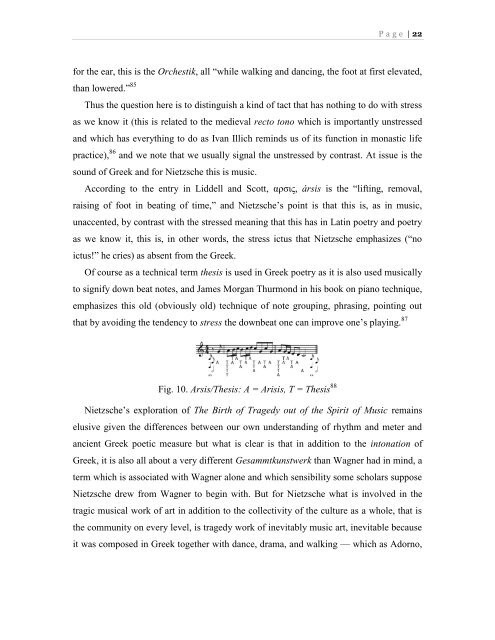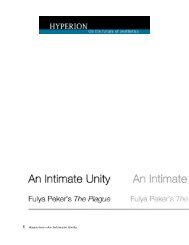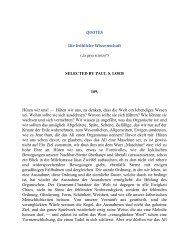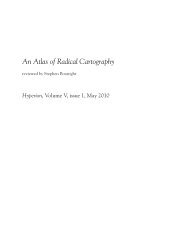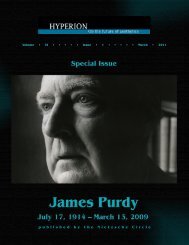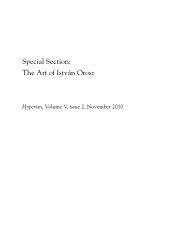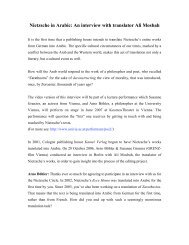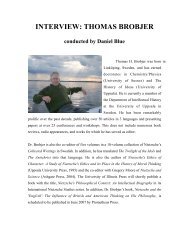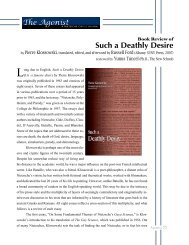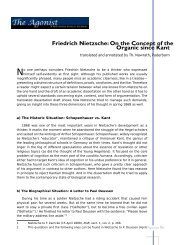Music, The Birth of Tragedy, and Nietzche's ... - Nietzsche Circle
Music, The Birth of Tragedy, and Nietzche's ... - Nietzsche Circle
Music, The Birth of Tragedy, and Nietzche's ... - Nietzsche Circle
Create successful ePaper yourself
Turn your PDF publications into a flip-book with our unique Google optimized e-Paper software.
P a g e | 22<br />
for the ear, this is the Orchestik, all “while walking <strong>and</strong> dancing, the foot at first elevated,<br />
than lowered.” 85<br />
Thus the question here is to distinguish a kind <strong>of</strong> tact that has nothing to do with stress<br />
as we know it (this is related to the medieval recto tono which is importantly unstressed<br />
<strong>and</strong> which has everything to do as Ivan Illich reminds us <strong>of</strong> its function in monastic life<br />
practice), 86 <strong>and</strong> we note that we usually signal the unstressed by contrast. At issue is the<br />
sound <strong>of</strong> Greek <strong>and</strong> for <strong>Nietzsche</strong> this is music.<br />
According to the entry in Liddell <strong>and</strong> Scott, αρσις, ársis is the “lifting, removal,<br />
raising <strong>of</strong> foot in beating <strong>of</strong> time,” <strong>and</strong> <strong>Nietzsche</strong>’s point is that this is, as in music,<br />
unaccented, by contrast with the stressed meaning that this has in Latin poetry <strong>and</strong> poetry<br />
as we know it, this is, in other words, the stress ictus that <strong>Nietzsche</strong> emphasizes (“no<br />
ictus!” he cries) as absent from the Greek.<br />
Of course as a technical term thesis is used in Greek poetry as it is also used musically<br />
to signify down beat notes, <strong>and</strong> James Morgan Thurmond in his book on piano technique,<br />
emphasizes this old (obviously old) technique <strong>of</strong> note grouping, phrasing, pointing out<br />
that by avoiding the tendency to stress the downbeat one can improve one’s playing. 87<br />
Fig. 10. Arsis/<strong>The</strong>sis: A = Arisis, T = <strong>The</strong>sis 88<br />
<strong>Nietzsche</strong>’s exploration <strong>of</strong> <strong>The</strong> <strong>Birth</strong> <strong>of</strong> <strong>Tragedy</strong> out <strong>of</strong> the Spirit <strong>of</strong> <strong>Music</strong> remains<br />
elusive given the differences between our own underst<strong>and</strong>ing <strong>of</strong> rhythm <strong>and</strong> meter <strong>and</strong><br />
ancient Greek poetic measure but what is clear is that in addition to the intonation <strong>of</strong><br />
Greek, it is also all about a very different Gesammtkunstwerk than Wagner had in mind, a<br />
term which is associated with Wagner alone <strong>and</strong> which sensibility some scholars suppose<br />
<strong>Nietzsche</strong> drew from Wagner to begin with. But for <strong>Nietzsche</strong> what is involved in the<br />
tragic musical work <strong>of</strong> art in addition to the collectivity <strong>of</strong> the culture as a whole, that is<br />
the community on every level, is tragedy work <strong>of</strong> inevitably music art, inevitable because<br />
it was composed in Greek together with dance, drama, <strong>and</strong> walking — which as Adorno,


